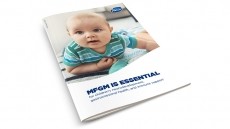WHO & UNICEF: ‘Take action to protect benefits of breastfeeding’

In a statement marking the 40th anniversary of the International Code of Marketing of Breastmilk Substitutes, the two agencies state only 25 countries have so far implemented measures that substantially align with the Code.
“A majority of countries have enacted legislation to implement at least some provisions of the Code,” they say.
“On the 40th anniversary of the Code, UNICEF and WHO call on governments, health workers, and the baby food industry to fully implement and abide by the Code requirements.”
World Health Assembly
The statement is a reminder of the progress made since the World Health Assembly met to address aggressive marketing tactics by the infant and young child feeding industry back in 1981.
Discussion led to the Code, a landmark policy framework designed to stop commercial interests from damaging breastfeeding rates and endangering the health and nutrition of babies and infants.
The Code remains as relevant today and the recent COVID-19 pandemic has led to accusations that baby foods marketers have used unfounded fears that breastfeeding could transmit COVID-19 to promote products.
In April 2020, The European Union moved to tighten the region’s regulations by limiting formula advertising to “publications specialising in baby care and scientific publications” and prohibiting the distribution of samples, or free or cheap products, either directly to consumers or indirectly or via healthcare workers.
“Mothers suspected or known to have COVID-19 should continue breastfeeding,” adds the WHO and UNICEF.
‘Protect, promote and support’
“Governments must enact and enforce legislation to prevent commercial interests from undermining breastfeeding, optimal infant and young child feeding, and the health of children and women, including during pregnancy and breastfeeding,” the two agencies emphasised.
“Health workers must protect, promote and support breastfeeding; they must not accept sponsorship from companies that market foods for infants and young children for scholarships, awards, grants, meetings, or events.”
The WHO and UNICEF also reminded the infant and young child feeding industry to publicly commit to full compliance, globally, with the International Code of Marketing of Breastmilk Substitutes and subsequent relevant World Health Assembly resolutions.
“Together, we must take the 40th anniversary milestone as an opportunity to celebrate the progress made in promoting and supporting breastfeeding and call to boldly protect breastfeeding as the best start in life, for every child.”














